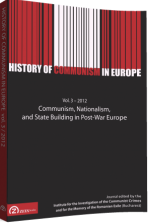Constructing Albanian Communist Identity Through Literature: Nationalism and Orientalism in the Works of Ismail Kadare
Constructing Albanian Communist Identity Through Literature: Nationalism and Orientalism in the Works of Ismail Kadare
Author(s): Enis SulstarovaSubject(s): Politics / Political Sciences
Published by: Zeta Books
Keywords: Albania; Communism Kadare; literature; nationalism; Orientalism
Summary/Abstract: The communist regime in Albania considered literature to be one of the main ideological vehicles for the formation of the “New Albanian Man”. To this aim, a great part of literature in post-war Albania spoke of how not only did the Albanian people preserve their national identity throughout history, but also of how they fought on the side of European civilization and progress. In this process, a series of barbarian Others were constructed, because if national resistance and communism were to be linked together in a progressive tradition, then the Turks, counter-revolutionary social classes, capitalism and even “revisionist” betrayers of Marxism-Leninism represented the regressive tradition. By taking as a case study the literary works of Ismail Kadare, this paper argues that Kadare, in his depiction of the Turks as the Oriental other of the Albanian nation, employed the clichés and stereotypes borrowed from the European Orientalist tradition, in which the Turks largely are presented as the barbaric mirror to Europe. Later on, the danger coming from the “social-revisionism” of the Russian and Chinese communist states were portrayed in Kadare's novels as the continuation of the “Asiatic threat”. The intended effect of Orientalism in Albanian literature was to emphasize the modernity of Albanian socialist society and to culturally justify the lonely road of Albanian communism.
Journal: History of Communism in Europe
- Issue Year: 2012
- Issue No: 3
- Page Range: 131-146
- Page Count: 16
- Language: English
- Content File-PDF

